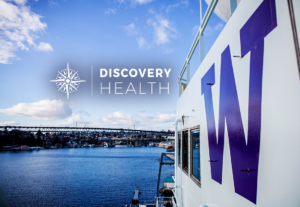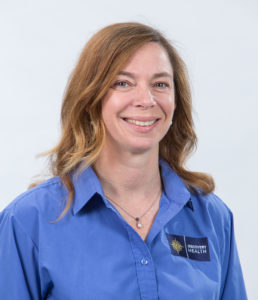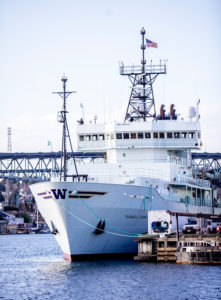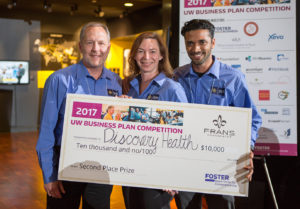Discovery Health MD COVID Response Helps UW Research Vessels
 The crew sat in Port Louis, Mauritius, an island east of Madagascar, thousands of miles from the University of Washington, when word of the coronavirus shutdowns first came in. The oceanographic research vessel R/V Thomas G. Thompson would need to cease operations before they arrived at the next scheduled port of Fiji. A several-week journey home to port at UW in Seattle followed. They arrived as a partnership began to unfold between the School of Oceanography and a Seattle-based startup with ties to the Foster School’s Buerk Center for Entrepreneurship. A collaboration that would allow them to eventually return to sea.
The crew sat in Port Louis, Mauritius, an island east of Madagascar, thousands of miles from the University of Washington, when word of the coronavirus shutdowns first came in. The oceanographic research vessel R/V Thomas G. Thompson would need to cease operations before they arrived at the next scheduled port of Fiji. A several-week journey home to port at UW in Seattle followed. They arrived as a partnership began to unfold between the School of Oceanography and a Seattle-based startup with ties to the Foster School’s Buerk Center for Entrepreneurship. A collaboration that would allow them to eventually return to sea.
“We heard Discovery Health MD’s name through references and recommendations, based on their excellent reputation with the fishing fleet across the Pacific Northwest,” said Robert Kamphaus, Manager of Marine Operations at UW. “They put out some great guidance for COVID-19 onboard procedures that quickly became a reference for a lot of operators to look at.”

CEO and Co-Founder Ann Jarris is a Maritime and Remote Medicine Specialist who practiced as a physician for over 15 years in urban and remote settings
Two years prior, the problem of scale, not sickness, was the biggest issue Discovery Health MD co-founder Ann Jarris and her team faced. As students out of Seattle University, they won the $10,000 second place prize in the 2017 UW Business Plan Competition (BPC) with a telemedicine and risk management program for the maritime industry. That summer after graduation, they began the six-month process of completing milestones in the Jones + Foster Accelerator.
“The biggest criticism we received was that it wasn’t clear how we would achieve growth,” said Jarris. “But by February 2020, we were a stable company. The Accelerator allowed us to build our infrastructure. The constructive feedback we got from that (and the BPC) was invaluable.”
Discovery Health MD learned of COVID-19 early in January from their cargo and petroleum clients calling into Chinese ports. When it became an issue locally, Jarris says they ramped up their response significantly and tripled their workforce. “We had the time pressure and social pressure to build a solution for the fishing industry because the local Alaskan communities needed a plan to keep COVID-19 out,” said Jarris. “We were in a good position because we were already a remote business by design. It’s not like we saw this coming. I was just sick of sitting in Seattle traffic.”
Jarris says the University of Washington figured into their response as Seattle was declared the de facto epicenter of the outbreak. “UW had a month head start on the rest of the country. They developed the best testing process in the nation and had the technical ability to make it happen.”
The occupational health application to a worksite is the niche Discovery Health MD fills. “It’s one thing to do testing, it’s another to come in and say here is your work environment and these are the testing guidelines we are recommending.”

The R/V Thomas G. Thompson and a smaller local research vessel R/V Rachel Carson are managed by UW Oceanography
Assisting with the research vessels managed by UW Oceanography also presented some unique challenges for Discovery Health MD. The R/V Thomas G. Thompson, and a smaller local research vessel named the R/V Rachel Carson, feature diverse crews. At any one time, dozens of technicians, students, faculty, and local and international researchers could be aboard the Thompson, or in a lesser capacity the Carson.
By coincidence, one of those crew members is the daughter of Jarris’ late husband and Discovery Health co-founder Ray Jarris. Marine operations manager Robert Kamphaus says he learned of that connection well after he first contacted them. He found Jarris through a COVID-19 talk she gave at a presentation hosted by National Fisherman (a publication dedicated to covering the U.S. commercial fishing industry). Later, he also discovered the connection Discovery Health MD had with UW and the Foster School of Business. Together, Kamphaus believed, they could provide the solution he had been looking for.
“We had a lot of people say you should be contacting UW Medical Center to get testing set up and arranged. It was clear that there was a missing piece. We needed a doctor’s order and we needed someone to collect the samples,” he said. “Discovery Health MD has quickly developed new tools and made things web accessible. They became the regional leader, and I would argue, a nationwide leader, in providing that service.”
The maritime industry also happens to be uniquely situated because of what Jarris calls “closed systems.” Testing and isolation can make sure the people put into the isolated environments aboard a vessel don’t have the disease and won’t introduce it to new people. “That’s what we have been trying to provide to people, this sense of continuity. Accept that our recommendations are going to change as our understanding of the disease changes. Accept that you are going to have to make operational shifts. But know that we will be with you. Our team is here to help you.”

The Discovery Health team won the second place prize in the 2017 BPC. Co-founder Ray Jarris (left) passed away in 2018
Jarris says it has been challenging having to be this flexible, but she knows it is going to continue to be an iterative process until the world is done with COVID-19. “Thank God we went through the Accelerator and learned these skills. When this happened in February, I reached out to everybody and our connections through UW and the Foster School of Business have been invaluable. I would tell people who are trying to build businesses during this time that there are places to learn these skills, you just have to put energy in.”
The next step for Discovery Health MD is to come up with solutions to open systems, like fish processing plants where people commute from home.
“This isn’t just an opportunity or a pivot, this is what our team was put on Earth to do,” said Jarris. “This is what Ray saw in us and knew we could do. This is our mission and I know our team is making Ray proud.”
# # #
Discovery Health MD graduated from the Jones + Foster Accelerator as part of the 2017 cohort and was awarded $25,000 in follow-on-funding. Discovery Health MD was also one of 11 regional startups chosen for the inaugural class of the Washington State Maritime Blue Innovation Accelerator. As Geekwire reported, the program aims to establish the region as a hub of innovation for maritime technology while also making the industry more environmentally friendly.
